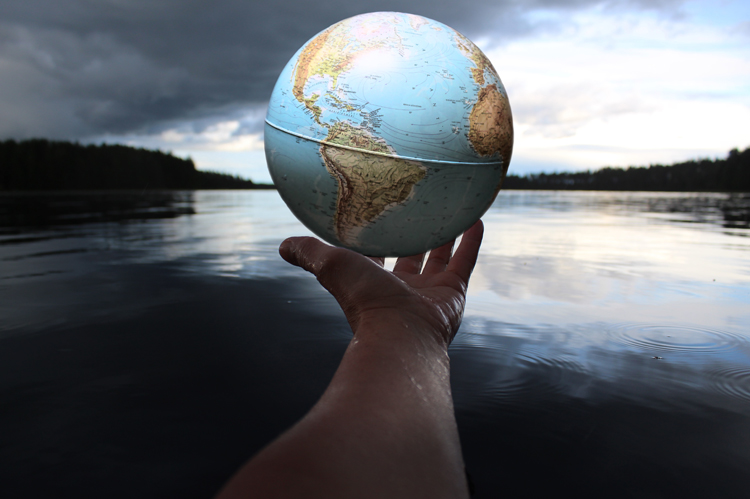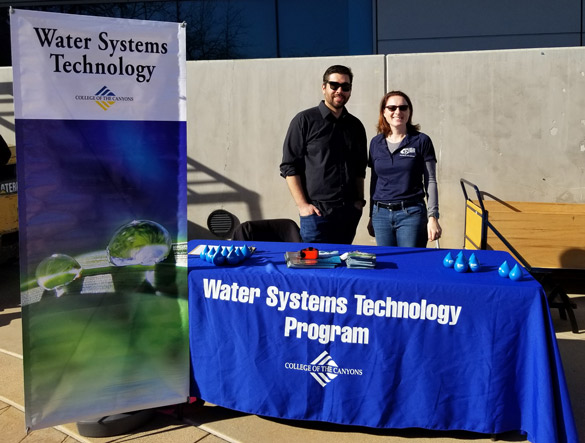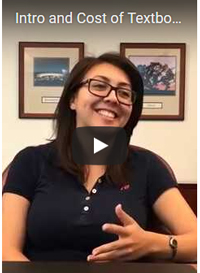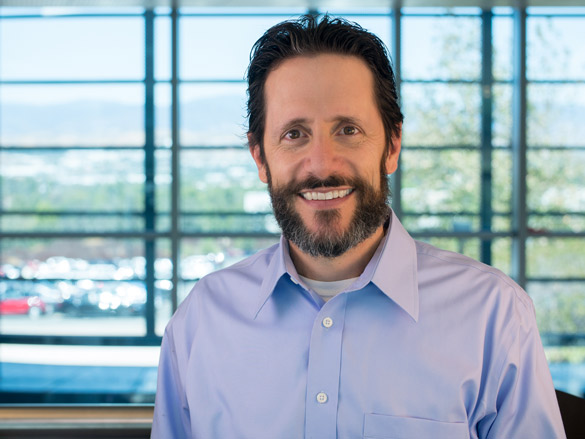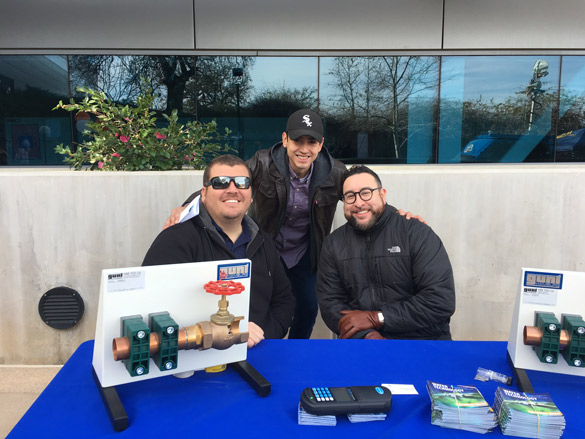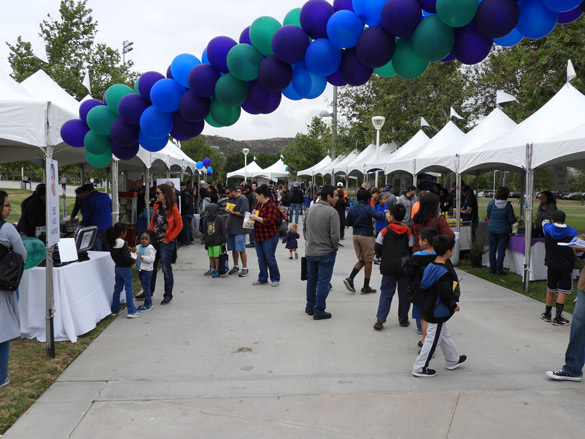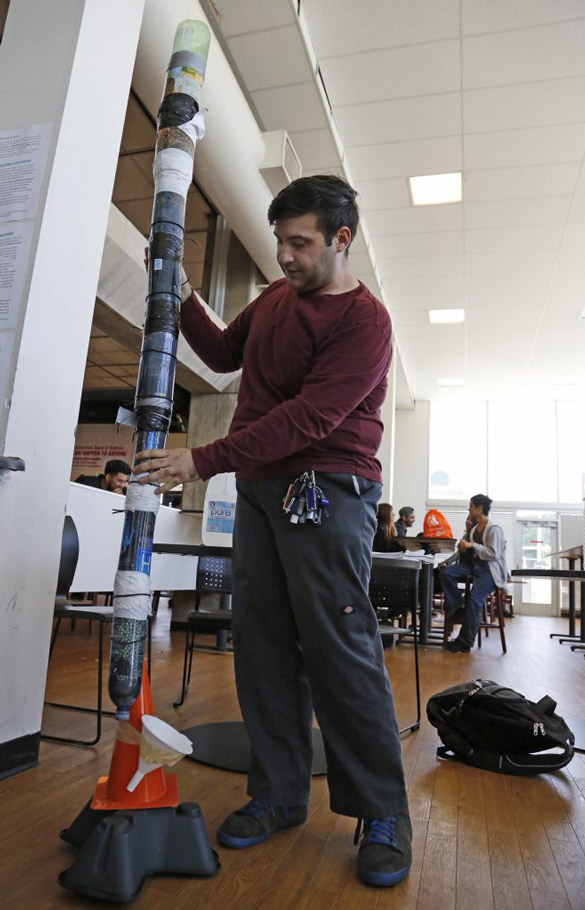News & Media

Caroline is a full-time student at College of the Canyons with a double major in Water
Systems Technology and Physics.
The following is her story of perseverance over five years and how the Zero Textbook Cost (ZTC) degrees helped reduce her costs and streamline her pathway to graduation this spring.
... "It was like $300 and we were all part-time students working part-time jobs and not making a lot of money so that was like the best option for us but obviously it’s so hard splitting a book four ways."
Connect with community colleges for a stronger workforce
Collaborative programs benefit employers, colleges, and students.
By Jim Meyers September 26, 2019
...College of the Canyons/Brown Engineers
Brown Engineers of Little Rock, Arkansas, was awarded a National Science Foundation (NSF) Grant of $225,000 to develop a curriculum in water engineering for students in high school and two-year colleges. The content is being piloted at College of the Canyons in Santa Clarita, Calif., to see how the curriculum could be enhanced to benefit water training at community colleges. Read full article.
Graphic: Interactive training simulations are popular with students and complement other types of collaborations, including internships, job shadowing, field trips, and more. Courtesy: Inductive Automation
OER Embraced
As California's community colleges implement degree pathways with no textbook costs, what -- if anything -- can be gleaned from their data?
By Lilah Burke | September 19, 2019
"We want, in the most transparent and affordable way possible, to provide our students with [a] coherent and cohesive educational experience,” said James Glapa-Grossklag, a dean at College of the Canyons and a co-coordinator for the program. “That includes removing the barrier to costly instructional materials, which have the effect of telling students without financial wherewithal that they don't belong in the classroom.” Read the full article.
COC hosts College2Career Day at Valencia Campus
January 26, 2019
With dozens of booths to check out or different activities to join in, College of the Canyons hosted hundreds of career seeking students at their College2Career Day on Saturday.
Each year we put on the college career day event and invite the public as a whole, specifically targeting high school students, with the intent of establishing that pathway to careers, said Omar Torres, COCs interim associate vice president of academic affairs.
Held in the Dianne G. Van Hook University Center, the career day event featured a number of college faculty members and vocational instructors who answered any and all questions for prospective recruits for their specific field. Read full article.
Student Story:
Water Systems Technology ZTC Degree
October 2, 2018
Caroline is a full-time student at College of the Canyons with a double major in Water Systems Technology and Physics. The following is her story of perseverance over five years and how the Zero Textbook Cost (ZTC) degrees helped reduce her costs and streamline her pathway to graduation this spring.
One of her quotes: If I had known that there was a whole major degree where I didn't have to pay for textbooks I would have felt so much more supported. I probably would have stayed in school and gone full-time because I was going part-time to be able to afford all those."
The interview was conducted by the Community College Consortium for Open Educational Resources (CCCOER), which is a partner on our ZTC degree work. The story is featured on the home page of CCCOER.
SCV Water Pipeline Article
SCV Water Staff Teaching at COC - Fall 2018 College of the Canyons and SCV Water Partner to Produce the Next Wave of Water Industry Professionals
Over the last 20 years or so, College of the Canyons (COC) has instructed thousands of students in Water Systems Technology (WST), preparing them for a career in the water industry.
SCV Water relies on this talent pool to add to and strengthen their workforce. Current employees can advance their career or earn continuing education credits required to renew State certifications for water treatment and distribution. New students have the opportunity to find employment as distribution operators, water treatment plant operators, water service representatives, water quality specialists, wastewater collection workers and/or wastewater
treatment operators.
Our very own Director of Operations and Maintenance, Mike Alvord, is the chair of the WST Advisory Board. READ THE FULL ARTICLE HERE
Mike Alvord | Director of Operations and Maintenance,
Chair of WST Advisory Board
News Release | March 31, 2018
College Launches Zero Textbook Cost Pathway for Water Technology Program
College of the Canyons has launched a Zero Textbook Cost (ZTC) degree for the Water Systems Technology program, utilizing Open Educational Resource (OER) materials. This degree will prepare students to become state certified water treatment, water distribution, and wastewater operators.
Funded by a ZTC grant from the state chancellors office, the water technology certificate program will benefit approximately 400 students this year. We are very excited to offer this completely Zero Textbook Cost pathway in Water Technology that provides students with the latest developments of knowledge in the field and has been personalized to match the educational rigor of the courses, said Brian Weston, project manager of Zero Textbook Cost grant at the college.
The pathway, which was created by COC faculty, field experts, contractors, and the South Central Coast Regional Consortium, will provide water technology programs across the state with a free alternative to commercial resources.
In 2009, two COC faculty members authored a textbook, and after successful feedback from students, developed a second textbook for the colleges Advanced Water Mathematics course in 2011.
Consisting of eight-member colleges, the South Central Coast Regional Consortium works to create a highly skilled workforce by supporting workforce development efforts across the state.
Read more of this great news online! ....
SCV News | COC Opens Floodgate of Resources for Water Tech Students
KHTS | College Of The Canyons Launches Zero Textbook Cost Pathway For Water Technology
News Release | March 29, 2018
Silver Star awarded to Water Systems Technology: 88% increase in earnings and 78% of students attained the regional living wage.
EdSurge Article | March 28, 2018
College Launches Zero Textbook Cost Pathway for Water Technology Program
Water is a unique discipline, its not like math or history or communication studies were major publishers put out multitudes of textbooks on, she says. Using OER in those courses, she added, really started out of necessity. And the program is especially topical at the college, which is situated south of the previously drought-stricken Central Valley and just north of Los Angeles, a hotbed of water rights history and challenges. Anagnoson says she considered using OER before her course was lumped into the Z-degree. Previously, her syllabus relied on a series of pamphlets from the Water Education Foundation, a California-based non-profit. But those materials were not ideal. Some, Anagnoson says, did not read at a deep level for students, and others assumed a lot of prior knowledge.
READ THE FULL ARTICLE HERE.
College2Career Day
The College2Career Day event highlights the relationship between academic programs
and career opportunities. In these photos, two of the Water Systems Technology program
faculty, Nick Steffen and Cris Perez, are sharing program and industry information
with perspective and current students.

SCV Water Open House
May is Water Awareness Month and SCV Water hosts an Open House celebration at their
facility in Central Park. The COC Water Program participated in the fair to promote
the Water Systems Technology academic programs.
News Release | May 9, 2017
Students construct water filtration devices for Hydro Ape Challenge
By Christina Cox
Two student teams from College of the Canyons (COC) tested their skills in and knowledge
of water filtration as part of the colleges biannual MakerFaire competition Tuesday.
In the Hydro Ape Challenge, students had the option to complete three different challenges
which included constructing an articulated ape hand, creating a filter for contaminated
water and producing a video blog for the fair.
Jason Oliver, department chair of the architecture and interior design program, said
the filtration competition included teams from the Chemistry Club and the architecture
program.
The filtration competition was organized by faculty, he said. We encouraged students
to use recycled elements or renewable elements instead of buying materials.
To test the filtration devices, the judges used two vials of water that included solutions made up of green food coloring, salt, vinegar and glitter.
They then tested the effectiveness of the devices using a pH test, a spectrophotometry
test to see if any light passed through and a conductivity test to see if any electrical
current passed through. The resulting water was also tested on smell and taste.
COC student Anthony Tashjian, who is studying biology and water systems at the college,
made his filtration device using water bottles, tape, a PVC pipe, wires, cotton balls,
dehydrated corn husks, charcoal, pebbles and other recyclable materials.
Called a gravity filtration system, the device took Tashjian about two to three hours
to build and another hour to test.
This design is good for putting rain water through it, he said. It can filter rainwater
to near drinkable levels.
In fact, Tashjian said he plans on using the device to filter rainwater in his yard
and use it to water his plants in the Lancaster/Palmdale area.
No students competed in the articulated ape hand portion of the challenge this year.
The challenge required participants to create a hand out of mechanics to test using
different grabbing tasks.
Oliver said that in the future, he hopes to integrate the ape hand challenge into
a class assignment.
ccox@signalscv.com
661-287-5575
On Twitter as @_ChristinaCox_
College of the Canyons student Anthony "Andrew" Tashjian explains how his water filtration system works in the cafeteria on Tuesday, May 9, 2017. Katharine Lotze/The Signal
College of the Canyons student Anthony Andrew Tashjian explains how his water filtration system works in the cafeteria on Tuesday, May 9, 2017. Katharine Lotze/The Signal

